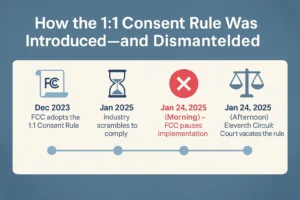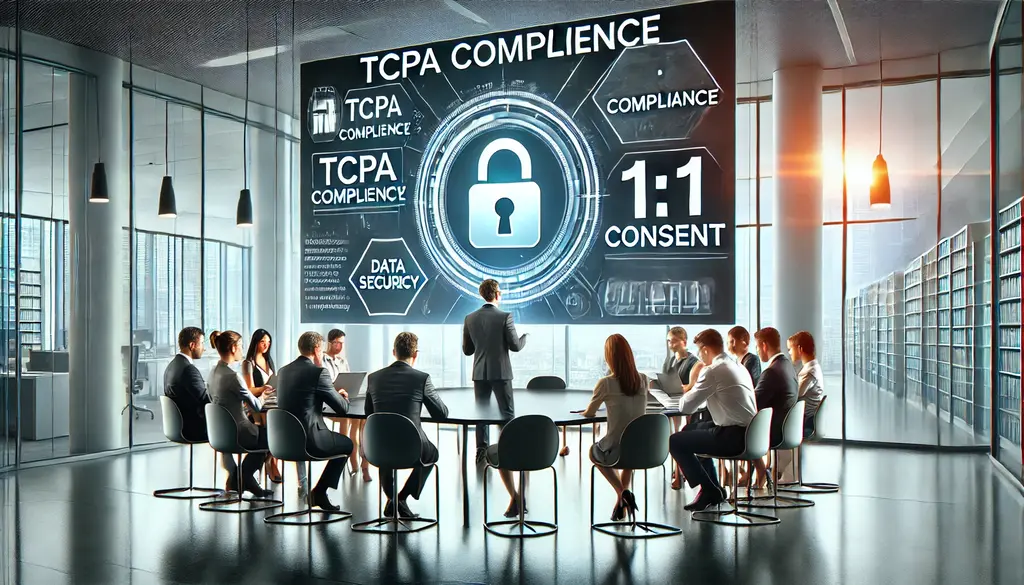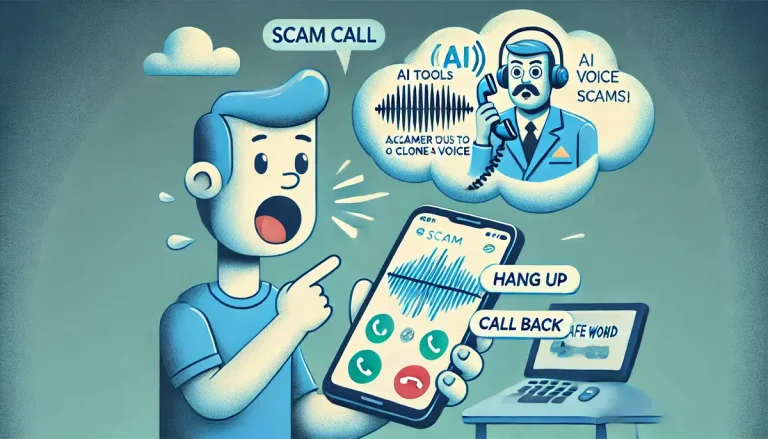Consent is now a legal requirement. They are the foundation of trust between businesses and consumers. In the past, marketing calls and texts reached people at any time. Then lawmakers introduced the Telephone Consumer Protection Act (TCPA).
At its core, TCPA consent means getting a customer’s clear approval. This approval must come before sending marketing calls or texts. Recently, the Federal Communications Commission (FCC) tried to tighten this rule. They introduced TCPA one-to-one consent, also known as TCPA 1:1. It required separate and specific consent for each seller. The goal was to close the lead generator loophole.
In this blog, we will explain the court ruling, the rules that remain in place, the risks of non-compliance, and the best practices to follow. For businesses, the goal is simple: stay compliant and protect consumer trust.
What Is TCPA Consent and Why Does It Matter?
Congress passed the Telephone Consumer Protection Act (TCPA) in 1991. Its goal was to protect consumers from intrusive and unwanted calls. The law introduced the concept of TCPA consent. This means a business must get approval from a person before sending automated marketing calls or text messages.
At its most basic level, this approval is referred to as telephone consent. It applies to non-emergency calls made with an automatic telephone dialing system. It also applies to calls that use a prerecorded or artificial voice. The law also covers marketing texts. Without consent, these calls and texts are not allowed.
The TCPA created two main forms of permission. The first is prior express consent. This law applies to certain non-marketing calls and texts, such as informational updates and reminders. The second is prior express written consent. This type of permission is required for telemarketing or advertising messages. In this case, the consumer must sign an agreement. The signature can be on paper or provided digitally. The agreement must demonstrate the individual’s consent to contact.
This difference matters. TCPA express consent shows that a consumer is open to hearing from a business. Prior express written consent goes further. It requires a clear record of the agreement. Both forms of consent give consumers control over who can contact them and the reasons for doing so.
The Rise and Fall of TCPA One-to-One Consent (1:1)
In December 2023, the Federal Communications Commission (FCC) introduced a new rule, known as TCPA one-to-one consent, also referred to as TCPA 1:1. This rule aimed to update the application of the TCPA prior to receiving express written consent to marketing calls and texts.
The rule mandated tying a consumer’s consent to a single identified seller. For example, on a comparison shopping website, a person would need to check a separate box for each seller they wanted to hear from. The FCC created this change to close the lead generator loophole. In the past, a single consent form could allow dozens of businesses to send robocalls or texts. The new TCPA rule requiring prior express written consent was designed to protect consumers from unwanted outreach.
On 24th January 2025, the FCC issued an order postponing the one-to-one consent rule for up to 12 months. The Commission stated that “justice requires postponement of the effective date of the rule.” It pushed the compliance date to January 26, 2026. However, the FCC noted that the date could come sooner if the Eleventh Circuit ruled before then and the FCC announced an earlier start.
Shortly after, the Eleventh Circuit Court of Appeals extended its ruling. The court granted the petition from the Insurance Marketing Coalition. It vacated the rule entirely. The judges stated that TCPA 1:1 exceeded the FCC’s authority, as TCPA 1:1 went beyond the FCC’s authority. They explained that the TCPA requires only “prior express consent” and nothing more. They ruled that adding a one-to-one requirement was not supported by the law.
For businesses, this sudden change was overwhelming. Many had already spent time and resources preparing for the January 27, 2025, effective date. Companies updated contracts. They redesigned consent forms. They trained employees. Suddenly, doubts emerged about that planning.
Industry leaders stressed that while the one-to-one rule is no longer a legal requirement, its purpose still matters. Giving consumers more control and transparency remains a best practice. Regulators at the FCC, FTC, and state levels continue to highlight the importance of consumer choice in handling personal data.
In the end, the fall of TCPA one-to-one consent shows how quickly compliance rules can shift. For now, businesses must continue to follow the long-standing TCPA rules requiring express written consent. At the same time, they should build trust with customers through clear disclosures and respect for consumer preferences.

Revocation of Consent Rules
As of April 11, 2025, new rules are in force. These rules give consumers more power over how businesses contact them. They focus on revocation of consent under the TCPA.
Consumers now have the right to take back their TCPA prior express consent at any time. They can do this by any reasonable means. This procedure may include replying “stop” to a text. It may also include asking over the phone. It can even be done by sending an email. The rule is clear. If a consumer indicates that they no longer wish to receive messages, the business must respect their choice.
Companies must honor a revocation request within 10 business days. This applies to both marketing calls and promotional texts. A business may send one final confirmation text. This text can only be used to confirm the request. Thereafter, no more contact is allowed unless new consent is given.
The risks of ignoring these rules are serious. Failure to honor withdrawals of express written consent can lead to heavy penalties. It can also result in lawsuits and regulatory action. On top of that, it can damage customer trust. Consumers of today demand respect for their choices. When a business continues to call or text after rescinding consent, it demonstrates disrespect. It also harms the company’s reputation.
The lesson is simple. TCPA express consent is not just a box to check. It is an ongoing responsibility. Businesses that honor opt-outs quickly stay compliant. They also show customers that their privacy and preferences matter.
Current TCPA Consent Requirements Businesses Must Follow
The TCPA 1:1 rule was vacated. But the core consent rules are still in place. These rules come from the 2012 FCC standard. They are still the foundation for compliance today. Businesses must follow these TCPA consent requirements. Such compliance helps them avoid lawsuits, penalties, and damage to their reputation.
TCPA Consent Form
A TCPA consent form must include clear disclosures. These disclosures must explain exactly what the consumer is agreeing to. The form must show that the consumer understands they will receive robocalls or text messages. The form must also include a signature. The signature can be collected digitally under the E-SIGN Act. A consumer can click, type, or check a box. If the action records their agreement in a verifiable way, it counts as consent.
Here is a simple TCPA express written consent example. A website form shows a checkbox that says, “Yes, I want to receive calls or texts about offers from [Company Name].” If the consumer checks the box and the disclosure is clear, the consent is valid.
Record-keeping
Record-keeping is another key rule. Businesses must keep consent records for at least five years. These records must include the date, time, and method of consent. They must also show the exact language the consumer agreed to. If a dispute happens, these records are the only proof that consent was given.
Do-Not-Call (DNC) registry
The Do-Not-Call (DNC) registry adds another compliance step. Telemarketing calls and texts cannot be sent to numbers on the DNC list. The only exception is if the consumer has given prior express written consent. This means that even people on the DNC list can choose to hear from a specific seller. Text messages are treated the same as calls.
Exceptions to TCPA Consent Rules
Not every call or text needs prior express consent. Some messages are too time-sensitive.
Emergency alerts are exempt. These include severe weather warnings. They also include notices about natural disasters. Safety risks also fall under this rule. Hospitals can send critical updates too. These may be recalls or urgent patient notices. In emergencies, speed is more important than paperwork.
These exceptions apply to landlines. They also apply to cell phones. TCPA cell phone consent is not required for real emergencies. The goal is to protect lives, not sell products.
The rule is strict. Only true emergencies qualify as exceptions. Sales pitches still require consent. Reminders also need approval. Promotions need it, too. The exemption cannot be used for marketing.
Risks and Penalties for Violating TCPA
Businesses must have prior express written consent before sending marketing calls or texts. Ignoring this rule has serious consequences.
Financial Penalty
The first risk is financial. Each violation can lead to a penalty of $500. If the violation is willful, the penalty increases. A knowing violation also increases the fine. The penalty then becomes $1,500 per call or text. For businesses that send large volumes of messages, these costs add up very fast.
Legal Penalty
The second risk is legal. Companies that break the rules may face lawsuits. Many lawsuits are filed as class actions. In these cases, multiple consumers combine their claims. Courts can also issue injunctions. An injunction means a business must stop outreach immediately. Such an order can disrupt daily operations.
Reputational Risk
The third risk is reputational. Consumers care deeply about their privacy. If a business ignores TCPA express consent rules, the damage goes beyond fines. Customers lose trust. Negative publicity spreads quickly. Rebuilding credibility is difficult. It is much harder than avoiding violations in the first place.
Best Practices for TCPA Consent Compliance
Staying compliant with the TCPA does more than avoid penalties. It also helps build trust with customers. The goal is simple: protect privacy and make consent clear.
Collecting TCPA prior express written consent
Start by collecting TCPA prior express written consent in a straightforward way. Disclosures should be short and easy to understand. A valid consent form must include the seller’s name and the consumer’s signature. Under the E-SIGN Act, typing, clicking, or checking a box all count as consent if they can be verified.
Use Tools to Document and Verify Consent
Use tools like TrustedForm to document and verify consent. These tools create proof at the moment permission is given. That record protects the business if questions or disputes come up.
Staff Training
Training employees is very important. Staff should know the difference between TCPA prior express consent and express written consent. Ongoing training helps reduce mistakes and keeps procedures consistent.
Make Opting Out Easy
Every call or text should offer a quick way to unsubscribe, like replying “stop” or clicking a link. Simple opt-outs show respect and reduce complaints.
Transparency
Tell customers why you ask for consent and how their data will be used. Show them how easy it is to stop communication. People are more likely to remain loyal when they perceive their choices as valued.
FAQs on TCPA Consent
What is TCPA consent?
TCPA consent means a consumer gives permission. Businesses need this before sending marketing calls or texts. Express consent applies to informational calls. Prior express consent applies to promotional messages. Without consent, outreach can break the law.
What are the TCPA’s prior express written consent requirements?
The TCPA’s prior express written consent requirements are simple. A valid consent form must include plain disclosures. It must also identify the seller. The form must show the consumer’s express written consent. A digital signature under the E-SIGN Act is acceptable.
Is TCPA one-to-one consent (TCPA 1:1) still required?
No. The TCPA 1:1 rule is also known as TCPA one-to-one consent. It was vacated in January 2025. Now, businesses follow the older, expressly written consent TCPA rules. These were set by the FCC in 2012.
What happens if a business violates TCPA consent rules?
Violating the TCPA prior express consent rules brings penalties. Each violation can cost $500–$1,500 per call or text. Companies may also face lawsuits. Courts can issue injunctions to stop outreach. Ignoring telephone consent also damages trust and reputation.
What should a TCPA express written consent example look like?
A TCPA express written consent example is a simple checkbox on a website form. For example: “Yes, I want to receive calls or texts from [Company Name].” Clear disclosures make it valid. A digital signature also confirms TCPA’s prior express written consent.









Great overview of the new TCPA regulations! The emphasis on specific, individualized consent offers a lot of clarity for businesses. I’m curious about how this might impact marketing strategies. Will companies need to overhaul their consent processes, or is this adjustment more about fine-tuning existing systems?
For those interested in how tech like AI ties into these processes, there’s some intriguing content on similar topics like machine learning in marketing over at sebbie.pl/tag/python/. It’s worth a look for anyone diving deep into consent management and data processing.
Thanks for this insightful guide!